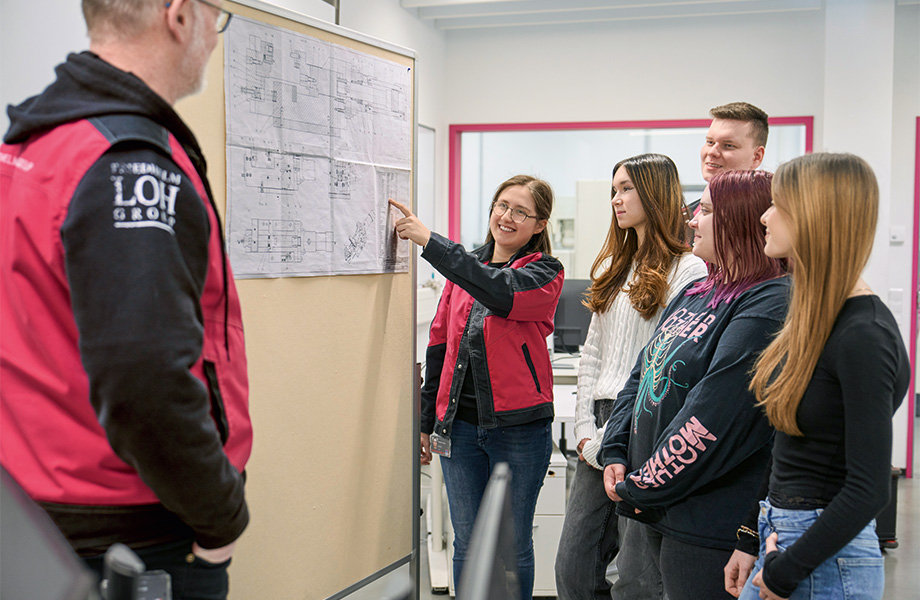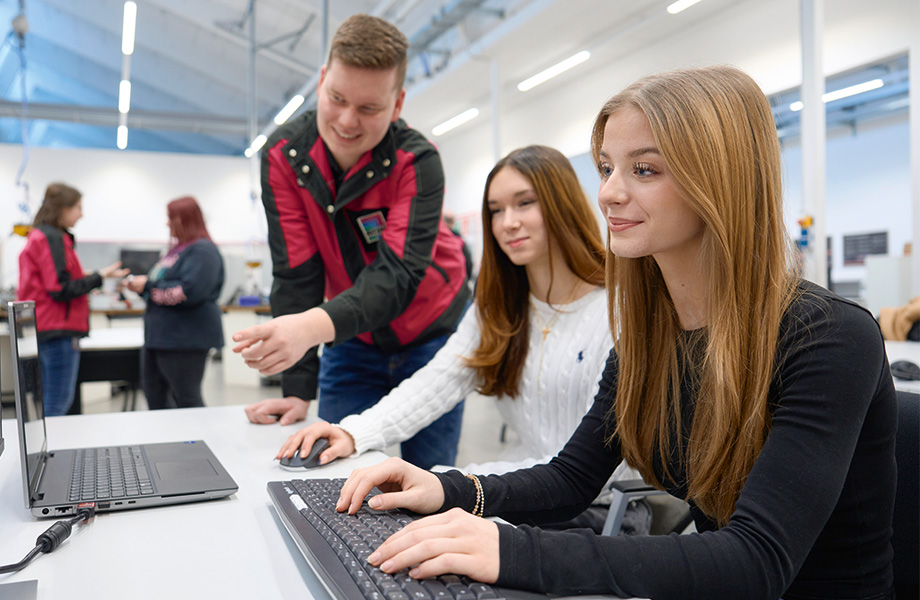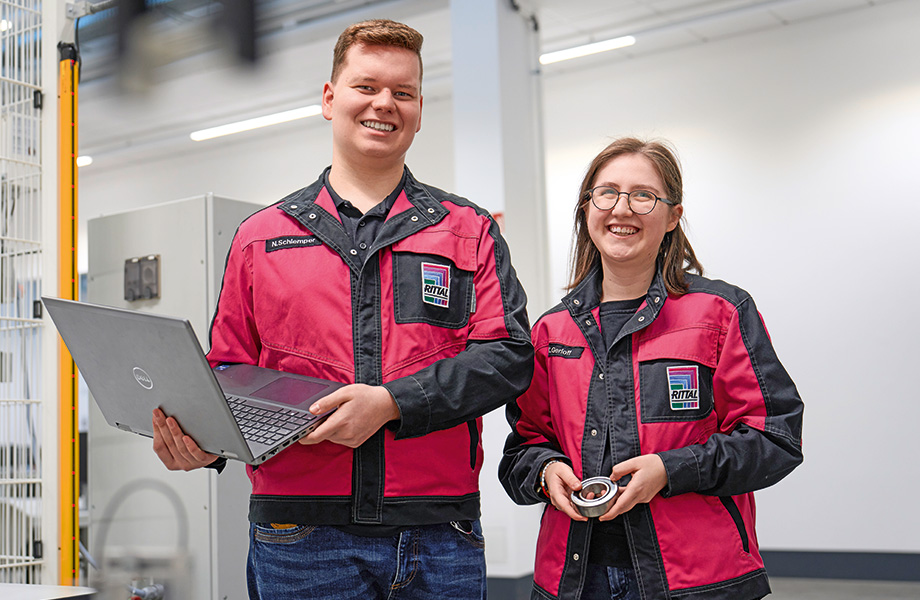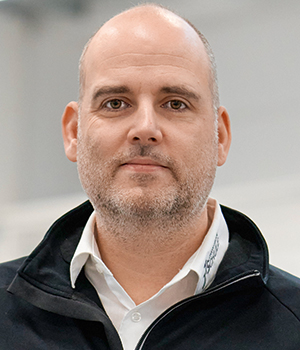Noah (18) can still remember exactly how it all came about. Less than a year ago, he was still at school, taking part in the new “SchulePlus” scheme – and today he is an apprentice at Rittal, the biggest company in the Friedhelm Loh Group, and is himself a mentor in the programme.
But let’s start at the beginning, back when Noah was still at the Johann-Textor school and had chosen an elective subject that involved learning how to use CAD software to create 3D drawings of components. He was then given the opportunity to gain practical experience as a “guest apprentice” in the Friedhelm Loh Group training workshop. “I really enjoyed the work and quickly realised it was right up my street,” he says. Last summer, he was then offered a contract to train as a technical product designer. What’s more, he was also asked if he would be interested in helping students at his former school get a better insight into the content of his apprenticeship.
CAREERS GUIDANCE – BUT PRACTICAL
What do I want to be? Young people like Noah ask themselves this question when they are thinking about leaving school to study or train. In other words, they’re deciding on their future. According to Alexander Schüler – the teacher at the Johann-Textor school who came up with the idea for the “SchulePlus” project – many students are worried about making the wrong decision and anxious about the new and unfamiliar situations that await them in the workplace. Years ago, he found himself increasingly puzzled by the massive drop in the number of apprentices in Central Hesse.
He talked to his students about it and asked questions – and it was those discussions that ultimately gave rise to the “SchulePlus” project. The aim was to develop a model that would enable young people “to gain practical experience and try out a particular job over a prolonged period of time, so they can find out if it is a good fit for them – but without any pressure to make a decision”. Once students have decided on a company and a job, they can then enter into a year’s contract that they complete while still attending school. “They can switch at any time,” explains Schüler. This model, which was launched in 2021, is the first of its kind anywhere in Germany. It didn’t take long to find collaboration partners in the region. One of the first partners was Rittal and the Friedhelm Loh Group.
“GUEST APPRENTICES” – A NEW MODEL
It was now a case of finding a way to enable the students to gain more practical experience. But how? As an example, students in their early to mid-teens in school years 8 to 10 can learn theory in their elective subject classes at school – such as the CAD course chosen by Noah – and also gain practical experience as “guest apprentices” in a company in the afternoons. In addition, apprentices visit the school to help out with lessons in the elective subject. For instance, Noah and Chiara – who are both doing product design apprenticeships at Rittal – help students who are learning about CAD.
What are the benefits of this? “I get the impression students ask more questions than they do when it’s just the teacher taking the class,” says Noah. On this particular Wednesday morning, he’s attending class 10 b as an “apprentice mentor”, where he’s being bombarded with questions about his choice of occupation. Noah and Chiara attend the class once a week. Similarly, students such as Jonna Müller (15) and Leonie Thomas (16) go to the Friedhelm Loh Group training workshop on a weekly basis. Jonna and Leonie are taking part in the “SchulePlus” programme, too, and now also have Rittal apprenticeships lined up, which will start in the summer.
Product design is both girls’ dream job – which has come as something of a surprise for Leonie at least. She explains that she was originally interested in training to become an optician, but discovered through the “SchulePlus” scheme that product design is something she really enjoys and is right up her street. Jonna also believes that the practical experience has helped her find out where her strengths lie. There’s another benefit of the scheme that she’s appreciated, too. “I’ve already been able to get to know the other apprentices and the trainers at the training workshop, and I’ve felt really comfortable there,” she says.
SITE VISIT BY THE MINISTER OF CULTURE
A delegation including Armin Schwarz, Minister of Culture for the Federal State of Hesse, was impressed by the concept during a site visit. Accompanied by Prof. Friedhelm Loh, owner and CEO of the Friedhelm Loh Group, Alexander Schüler, Tobias Sohn and Head of Training Daniel Wirth, Schwarz was given a guided tour of the training workshop and the concept was explained to him. The “SchulePlus” project is a matter of great importance to Prof. Friedhelm Loh, who described the link between studying theory at school and gaining practical experience in the workplace as one of its major benefits. In this respect, it is similar to the StudiumPlus dual work/study programme offered by the Central Hesse University of Applied Sciences – a programme that Prof. Loh helped to found. “Getting young people interested in technology is more important than ever, including with regard to Germany’s standing as a business location and the country’s skills shortage,” he comments. And what does Schwarz, the Minister of Culture, think of the programme? His response is enthusiastic. “Not only does the project support a seamless transition from school to the world of work, it also strengthens Hesse as an economic region,” he says.
Noah, meanwhile, is “more than happy” to have opted for an apprenticeship at Rittal and to have the chance to share his knowledge with others. “The whole programme really helped me find out which job suits me, what I enjoy doing, and the direction I want to go in, so now I’d like to help others, too.”



